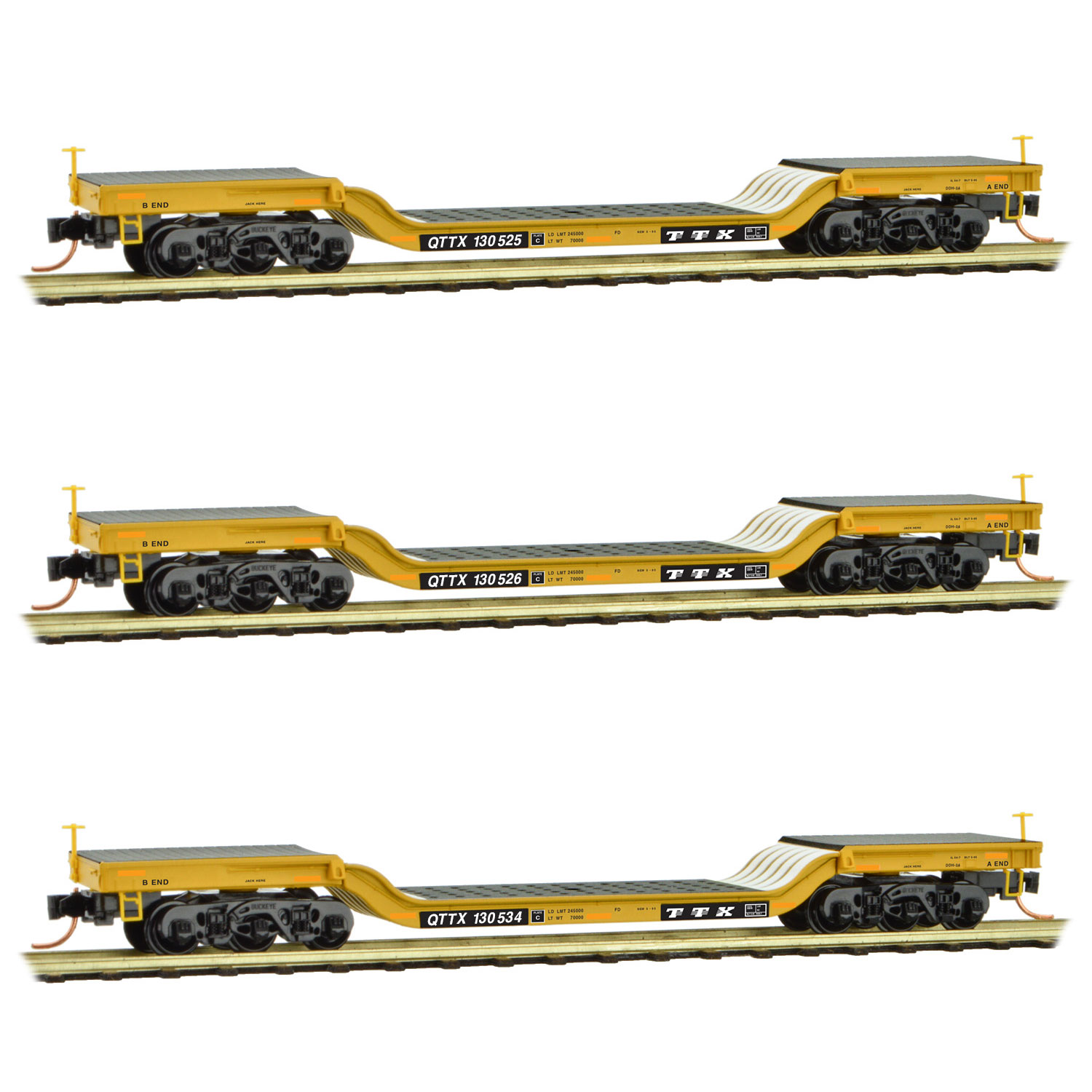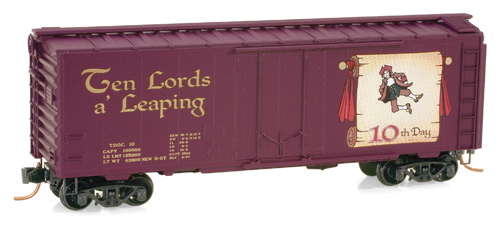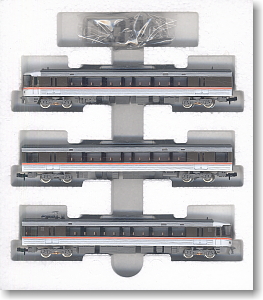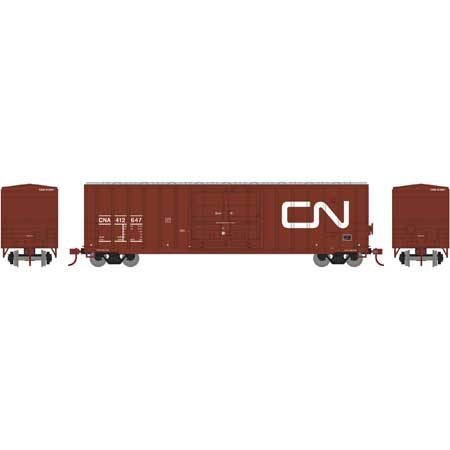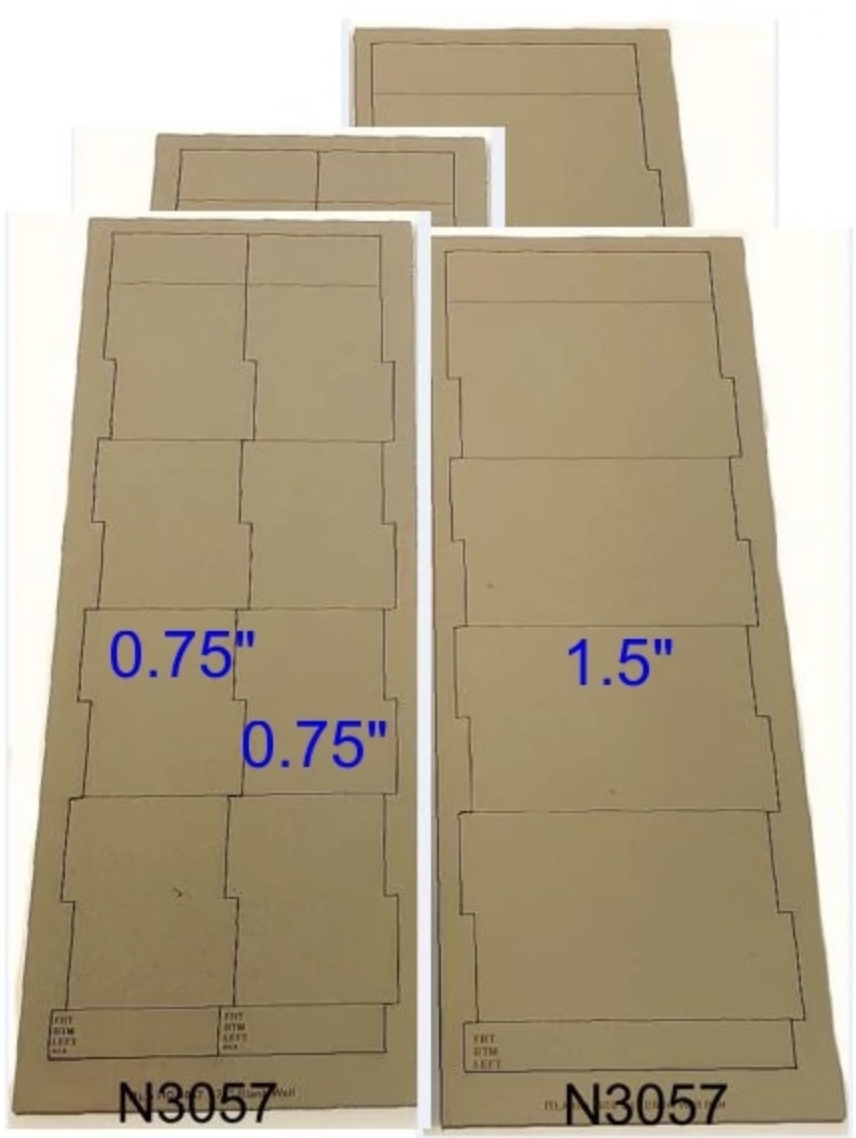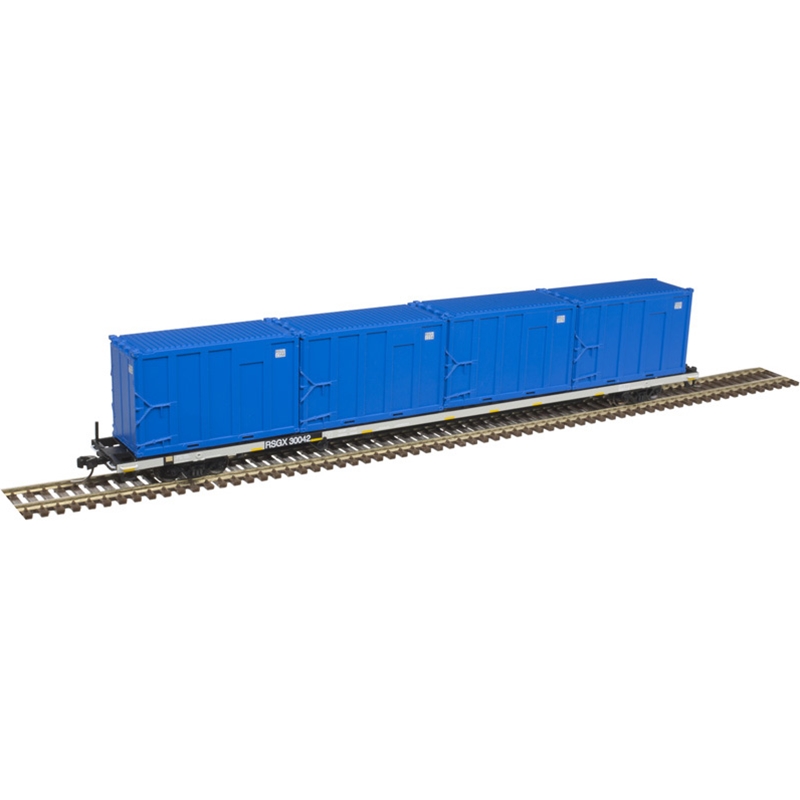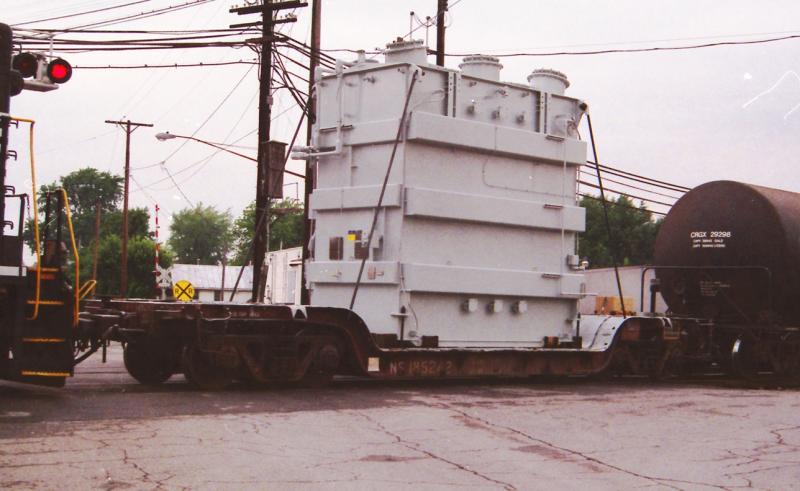Specific Item Information: These heavyweight depressed-center flat cars are yellow with white lettering and run on Buckeye trucks. Built in the mid-1990s as part of series 130525-130534, it was used to carry oversize and heavy industrial loads, such as transformers, stationary power plants, and substation equipment. The lowered center of the car allows for necessary overhead clearance for the lading.
Road Numbers: 130525, 130526, 130534
Road Numbers: 130525, 130526, 130534
Model Information: Many times since Micro-Trains/Kadee first started producing cars in 1972, they have sold 'multipacks' of cars in shrink-wrapped bundles. These releases have bundles several different items with the same theme together in a single shrink-wrapped packaged. However, in April of 2007, due to demand for groups of cars with the same paint scheme yet with different road numbers, the "Runner Pack" was born.
Runner pack number one got a special presentation box instead of simple shrink wrap and contained four different Pennsy boxcars with identical paint schemes yet different road numbers. These releases were intended for people who like to "run" their cars yet like each car to have a different road number. The 4-car runner packs have been very successful and were joined later by 8-car packs as well as 3-packs of larger, more expensive cars. Over 100 different box sets in this series have been produced by MTL as of 2017.
Runner pack number one got a special presentation box instead of simple shrink wrap and contained four different Pennsy boxcars with identical paint schemes yet different road numbers. These releases were intended for people who like to "run" their cars yet like each car to have a different road number. The 4-car runner packs have been very successful and were joined later by 8-car packs as well as 3-packs of larger, more expensive cars. Over 100 different box sets in this series have been produced by MTL as of 2017.
Prototype History: A flatcar (US) (also flat car (US) or flat wagon (UIC)) is a piece of railroad (US) or railway (non-US) rolling stock that consists of an open, flat deck mounted on a pair of trucks (US) or bogies (UK), one at each end containing four or six wheels. Occasionally, flat cars designed to carry extra heavy or extra large loads are mounted on a pair (or rarely, more) of bogeys under each end . The deck of the car can be wood or steel, and the sides of the deck can include pockets for stakes or tie-down points to secure loads. Flatcars designed for carrying machinery have sliding chain assemblies recessed in the deck.
Depressed center flat cars are of a special construction having the portion of floor extending between trucks depressed to provide necessary overhead clearance for lading. When large and heavy loads need to be moved long distances railroads are often the best choice for the job. These loads are often tall enough that they wouldn't pass safely under bridges or other obstacles if carried on conventional flat cars. To provide extra clearance, railroads use heavy-duty, depressed center flat cars. The lower center deck provides several inches of extra clearance, and since the cargo does not have to be lifted as high, loading and unloading is easier.
Depressed center flat cars are of a special construction having the portion of floor extending between trucks depressed to provide necessary overhead clearance for lading. When large and heavy loads need to be moved long distances railroads are often the best choice for the job. These loads are often tall enough that they wouldn't pass safely under bridges or other obstacles if carried on conventional flat cars. To provide extra clearance, railroads use heavy-duty, depressed center flat cars. The lower center deck provides several inches of extra clearance, and since the cargo does not have to be lifted as high, loading and unloading is easier.
Road Name History: TTX Company (formerly Trailer Train until 1991) is a leading provider of railcars and related freight car management services to the North American rail industry. TTX's pool of railcars (over 220,000 cars and intermodal wells) is ideal for supporting shippers in the intermodal, automotive, paper & forest, metals, machinery, wind energy and other markets where flatcars, boxcars and gondolas are required.
Owned by North America's leading railroads, TTX's free-running pools provide fungible assets that minimize total empty miles, further lowering costs and minimizing risk for the industry, helping the railroads conserve their capital for other critical infrastructure needs. Customers easily recognize TTX's bright yellow cars as a consistent, high quality, well-maintained fleet that serves many transportation needs.
Owned by North America's leading railroads, TTX's free-running pools provide fungible assets that minimize total empty miles, further lowering costs and minimizing risk for the industry, helping the railroads conserve their capital for other critical infrastructure needs. Customers easily recognize TTX's bright yellow cars as a consistent, high quality, well-maintained fleet that serves many transportation needs.
Brand/Importer Information: Micro-Trains is the brand name used by both Kadee Quality Products and Micro-Trains Line. For a history of the relationship between the brand and the two companies, please consult our Micro-Trains Collector's Guide.
Manufacturer Information:  Micro-Trains Line split off from Kadee Quality Products in 1990. Kadee Quality Products originally got involved in N-Scale by producing a scaled-down version of their successful HO Magne-Matic knuckle coupler system. This coupler was superior to the ubiquitous 'Rapido' style coupler due to two primary factors: superior realistic appearance and the ability to automatically uncouple when stopped over a magnet embedded in a section of track. The success of these couplers in N-Scale quickly translated to the production of trucks, wheels and in 1972 a release of ready-to-run box cars.
Micro-Trains Line split off from Kadee Quality Products in 1990. Kadee Quality Products originally got involved in N-Scale by producing a scaled-down version of their successful HO Magne-Matic knuckle coupler system. This coupler was superior to the ubiquitous 'Rapido' style coupler due to two primary factors: superior realistic appearance and the ability to automatically uncouple when stopped over a magnet embedded in a section of track. The success of these couplers in N-Scale quickly translated to the production of trucks, wheels and in 1972 a release of ready-to-run box cars.
Micro-Trains Line Co. split off from Kadee in 1990 to form a completely independent company. For this reason, products from this company can appear with labels from both enterprises. Due to the nature of production idiosyncrasies and various random factors, the rolling stock from Micro-Trains can have all sorts of interesting variations in both their packaging as well as the products themselves. When acquiring an MTL product it is very important to understand these important production variations that can greatly enhance (or decrease) the value of your purchase.
Please consult our Micro-Trains Collector's Guide

Micro-Trains Line Co. split off from Kadee in 1990 to form a completely independent company. For this reason, products from this company can appear with labels from both enterprises. Due to the nature of production idiosyncrasies and various random factors, the rolling stock from Micro-Trains can have all sorts of interesting variations in both their packaging as well as the products themselves. When acquiring an MTL product it is very important to understand these important production variations that can greatly enhance (or decrease) the value of your purchase.
Please consult our Micro-Trains Collector's Guide
Item created by: gdm on 2018-09-07 12:51:06. Last edited by George on 2024-01-26 20:29:09
If you see errors or missing data in this entry, please feel free to log in and edit it. Anyone with a Gmail account can log in instantly.
If you see errors or missing data in this entry, please feel free to log in and edit it. Anyone with a Gmail account can log in instantly.


